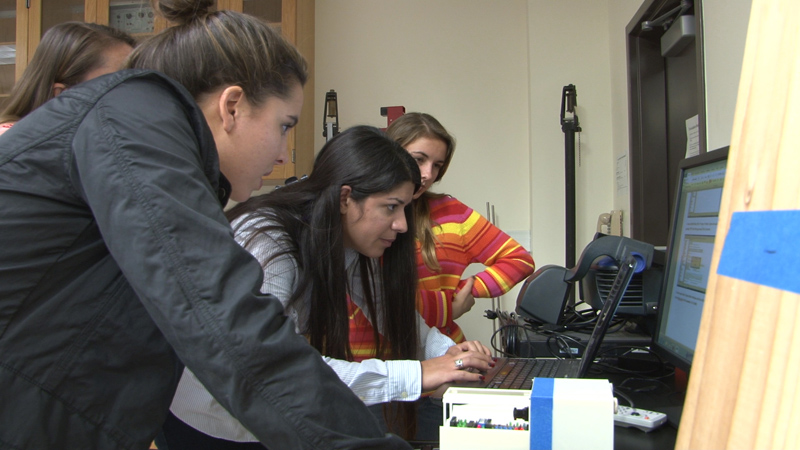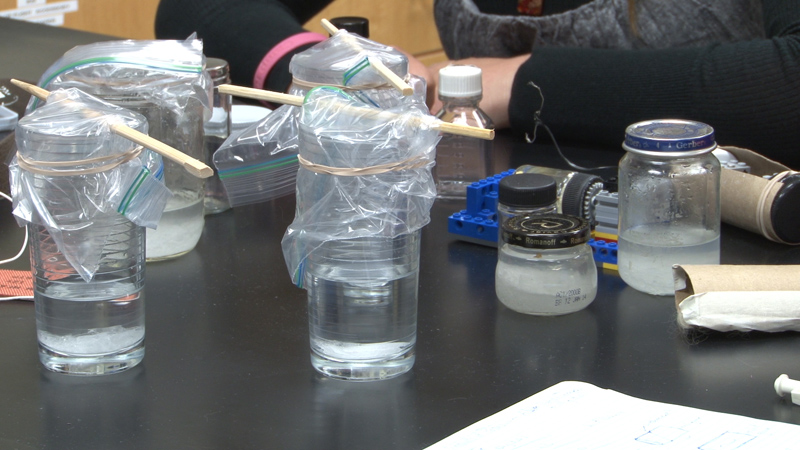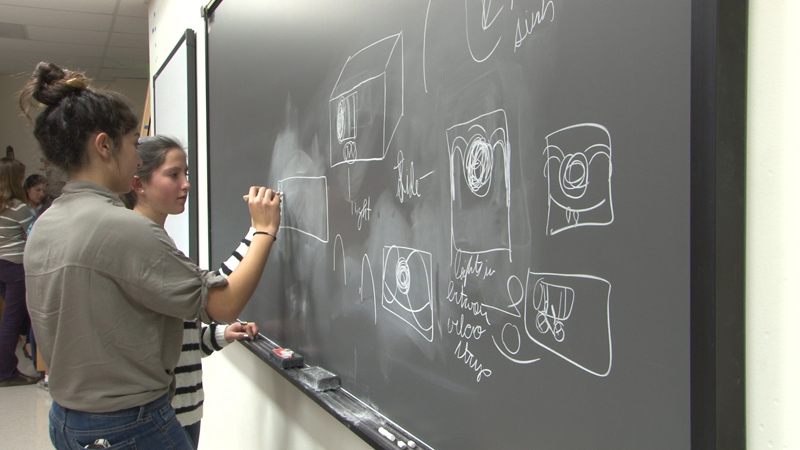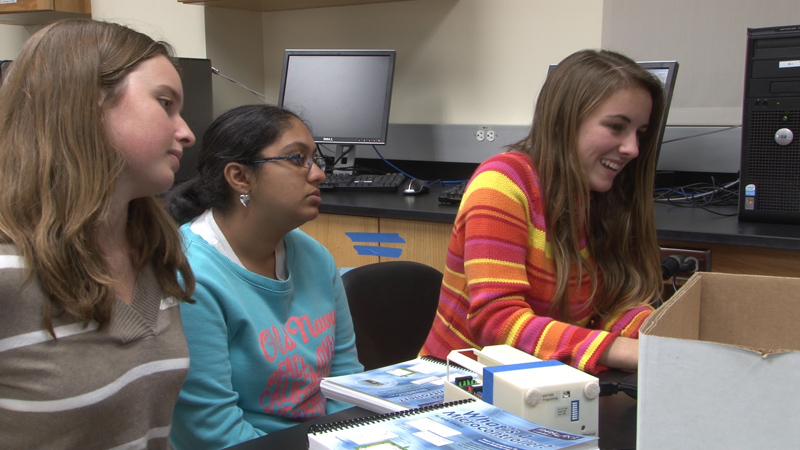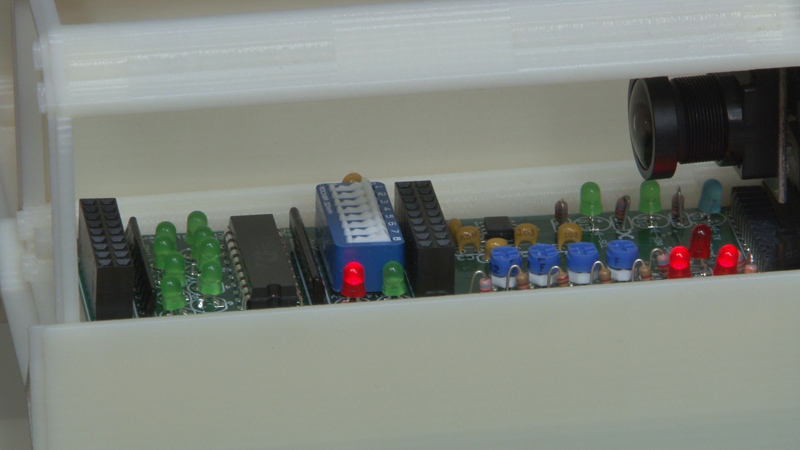California High School Girls Build Experiment for Space Station
San Diego, Dec. 5, 2012 -- Nearly 150 people showed up Dec. 4 for the kickoff of a unique program that is allowing high school girls to get a feel for a career in science, technology -- and space exploration. Fifteen girls from around San Diego County, each from a different school, are building a micro-experiment scheduled to be deployed on the International Space Station (ISS) in March 2013. They are building a crystal growth experiment for a microgravity environment.
|
All of the girls participating in the project are members of Better Education for Women in Science and Engineering (BE WiSE), a program of the San Diego Science Alliance (SDSA), an important catalyst of Science, Technology, Engineering and Math (STEM) learning for K-12 students in San Diego County. “As part of our mission, SDSA strives to build bridges between business, education and scientific research communities to ignite STEM learning. We are extremely excited to be a part of this collaborative voyage into space.” said SDSA Executive Director Nancy Taylor.
Taylor opened the kickoff event in the Calit2 Auditorium, and she was followed at the podium by CEO Jim Young of Realcomm Conference Group, the corporate sponsor of the program and a tireless advocate for improving STEM education, particularly among girls. Calit2 director Larry Smarr told the audience of family, friends, teachers and principals that he had just come back from a week of meetings at NASA, and that he had briefed the NASA Director on the ISS program. The final speaker of the evening was Werner Vavken, the original developer of the ISS program for high school students. Vavken is the Chair of the Advisory Board for the Applied Mathematics, Science and Engineering (AMSE) Institute of Valley Christian Schools in the heart of Silicon Valley.
|
“BE WiSE provides opportunities for girls to interact with women who are professionals in the field,” said the program’s co-founder, Patricia S. Winter, prior to the event. “Fortunately, this thrilling opportunity was introduced to BE WiSE from The Quest Institute for Quality Education in partnership with the Applied Math Science and Engineering Institute of Valley Christian Schools in San Jose, California, where they are working for the third year in a row to send experiments to the International Space Station.”
The San Diego experiment is one of eight student-designed devices to be deployed in a so-called NanoLab aboard the ISS. The experiment will spend one month in orbit traveling approximately 15 million miles at an altitude of about 250 miles above the Earth. The dimensions of the capsule are just 2 inches by 2 inches by 4 inches.
“They have to solve the problems of creating a micro experiment that must fit and perform in a very confined environment,” said Shari Duran, a subject area specialist at Steele Canyon Charter High School, one of 13 San Diego area high schools participating in the project. “The energy, excitement and teamwork the girls generate as they apply their science and math knowledge is truly inspiring.”
All team members independently completed a programming and circuit-board project before the team began to meet in September.
|
Each of the 15 girls has assumed the real tasks of a research or payload scientist, programmer, or engineer in creating the experiment. “They are learning how to work as a team even though they come from different schools,” said Lara Dickens, a BE WiSE mentor and science teacher at Patrick Henry High School. “They are working against a tight deadline, so they are also learning how to communicate between and among each sub-group to accomplish tasks under demanding time and space constraints.”
I
|
Realcomm encouraged Calit2 to become a supporting sponsor of the project. “We are very much about working with industry and non-profit groups to provide hands-on research experiences that engage students from interdisciplinary backgrounds,” said Larry Smarr, director of Calit2, a partnership of UC San Diego and UC Irvine. “Calit2’s MyLab program led by Saura Naderi at UCSD gets undergraduate engineering volunteers to work closely with young girls from underserved K-12 schools, so helping the girls get their ISS experiment ‘off the ground’ was a natural fit.”
|
Schools represented by the students on the BE WiSE space station project include: Academy of our Lady of Peace; Canyon Crest Academy; Carlsbad High School; Cathedral Catholic High School; La Jolla High School; Mission Vista High School; Patrick Henry High School; Rancho Buena Vista High School; San Diego High School of International Studies; San Marcos High School; Santa Fe Christian Schools; The Bishop's School; and Torrey Pines High School.
The experiment will be deployed to NASA’s U.S. National Lab aboard the International Space Station, and made possible by NanoRacks, LLC, via its Space Act Agreement with NASA. The company’s facilities two NanoLab Platforms, a NanoRacks Plate Reader, NanoRacks Microscope and NanoRacks MixStix, all of which provide repeatable microgravity research opportunities on the ISS. NanoRacks recently had its busiest quarter yet, after sending up 25 payloads about the SpaceX, the first commercial space vehicle to dock with the International Space Station.
About the San Diego Science Alliance
The San Diego Science Alliance (SDSA) has been the “trusted point of contact for science education” in San Diego County for 17 years. The SDSA is a 501c3, non-profit corporation that builds bridges between the region’s diverse business, education and STEM research communities, and fosters public/private partnerships to increase STEM literacy to connect the region’s 500,000 K-12 students and teachers with STEM professionals. Its electronic distribution base of over 4,000 individuals, unique website hits of 17,600, a combined total of 32,450 students and teachers serviced by 3,985 volunteer hours is a testament to its county-wide reach in delivering quality experiential programs. www.sdsa.org
About Better Education for Women in Science and Engineering (BE WiSE)
Since 1999, the BE WiSE program of the San Diego Science Alliance (SDSA) has engaged over 900 hundred, 7th-12th grade young women in science, technology, engineering and math (STEM) learning experiences in collaboration with the region's research, industry and academic institutions. Through STEM themed overnights at local institutions, Saturday workshops provided through real-world partnerships and specialized academies throughout the summer, BE WiSE strengthens young girls abilities to succeed in an innovation-based economic society. Surveys show that once in the BE WiSE Program, every girl knew more about science, every girl agreed that women can excel in science and engineering, 85% reported considering a career in science or engineering, and more than half planned to take a course that they would not have taken otherwise. www.sdsa.org/programs/be-wise
About Realcomm
Realcomm Conference Group, LLC is the leading research and educational institution that produces annual conferences and expositions on technology, automated business solutions and intelligent buildings strategies for executives in commercial, corporate, government and institutional real estate. Realcomm was founded in 1999 with the goal of bringing industry leaders together to discuss, demonstrate and debate the latest innovations that impact the industry. Today, in addition to the annual conferences, Realcomm conducts webinars, workshops and other strategic services to educate industry professionals about the latest business solutions and technologies to improve commercial real estate development, leasing, management and operations. www.realcomm.com
About The Quest Institute for Quality Education
The mission is to develop and sustain premier comprehensive schools in support of the Quest for Excellence through Academic Achievement, Artistic Beauty and Athletic Distinction. The purpose is to support schools and organizations in pursuit of the Quest for Excellence and quality educational instruction. The Institute shall uphold the Judeo-Christian values of our Founding Fathers whose writings include the Declaration of Independence, the United States Constitution, the Bill of Rights and other documents. The Quest Institute makes space science available to schools and organizations with its ISS Partnership Program. www.thequestinstitute.com
About Valley Christian Schools
Valley Christian Schools (VCS) is a private, K-12 Christian school system located in the heart of Silicon Valley in San Jose, California. Valley Christian Schools, a Quest Institute for Quality Education host school, provides rigorous college preparatory programs while offering a K-12 comprehensive education. VCS challenges students to aspire toward lives of character, service, and influence while pursuing their individual Quest for Excellence through A3 - Academic Achievement, Artistic Beauty and Athletic Distinction. www.vcs.net.
About NanoRacks, LLC
NanoRacks, LLC provides the ultimate 'Plug and Play' microgravity research facilities allowing small standardized payloads to be plugged into any of our platforms, providing interface with the International Space Station power and data capabilities. The company brings together entrepreneurs, scientists and engineers who have real-life experience and share a passion for space including humanity's utilization of low-earth orbit. NanoRacks have partnerships with a growing list of world-class organizations that allows them to provide seamless support from customer interface to payload development to space station integration. www.nanoracks.com
About the California Institute for Telecommunications and Information Technology (Calit2)
Calit2 is a partnership of UC San Diego and UC Irvine, and it is one of the four Gray Davis Institutes of Science and Innovation created in 2000 by the State of California to keep the state at the forefront of technological innovation. The institute’s outreach and educational activities cut across the four application thrusts spelled out in Calit2’s strategic plan: culture, energy, environment, and health. Calit2 also invests in enabling technologies, notably wireless, photonics, cyberinfrastructure, and nano-micro-electromechanical systems (nano-MEMS). www.calit2.net
Media Contacts
Doug Ramsey, Calit2, 858-822-5825, dramsey@ucsd.edu; Ellen Peneski, SDSA, 619-325-9119, epeneski@eepconsulting.com; or Cheri L. Parr, Realcomm, 310-421-4362, cparr@realcomm.com
Related Links
San Diego Science Alliance
Better Education for Women in Science and Engineering (BE WiSE)
Realcomm Conference Group
The Quest Institute for Quality Education
Valley Christian Schools
NanoRacks, LLC
Calit2


